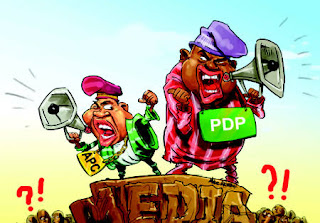NIGERIAN POLITICS: CONTEMPORARY PRACTICES
 |
| Credit: eie.ng |
With these structures of our country, I must say that they did not just arrive from nowhere. As a nation we have a history from pre-colonial era. There are structures which are relatively similar to that of the pre-colonial structures.
The politics of Nigeria is practiced by the actors within the framework of the arms and other levels of Government consisting of the Executive, Legislative, and the Judicial Arms.
 |
| Credit: en.wikipedia. org |
The Merriam Webster dictionary defines politics as “the art or science concerned with guiding or influencing Governmental policy.” OR “the total complex of relations between people living in a society.” OR “the political affairs especially competition between competing interest groups or individuals for power and leadership as in a Government.” The scholar Aristotle views all humans as by nature ‘political animals’. Politics is generally the methodology and activity associated with running a Government. All these definitions present politics as the act of Governing a group where ‘governing’ is the process of appropriating common resources for the common good of all citizens as well as overseeing the affairs of an entity.
Considering that politics is the art of Governing which has to do with taking decision(s) on behalf of and in the interest of all persons in the society, politicians will have to contest and be voted for by members eligible to do so. This therefore suggests that the confidence given to them (leaders) by voters requires selfless and dedicated service.
 |
| Credit: Abusidiqu.com |
Another way of explaining what has characterised our politics in Nigeria as a nation is attributing it to greed and selfishness. This is generally the excessive desire to have more than is needed or deserved. This has characterised virtually all political actors; both the aspirants (eventual political office holders) and the electorates are caught up in the same net of selfishness and greed. The political office holders invest so much in giving out food items, cars, motor cycles, clothes etc. in order to win the hearts of the electorates who even scramble over the scarce of such items. Political elephants loot so much public resources out of selfishness and pass a few to the grass, who out of love for only themselves also hijack such within the line of distribution, as some grasses are taller than others. The so-called law enforcement agencies are in some cases equally caught up in the net.
So many hearts in Nigeria are heavily spiced up with self-centeredness and voracity. These have left us with just one dream away from the good life and one step away from the hard times that follow us. The egocentrism of so many electorates have left us continuously falling to the old tricks of politicians. I have searched over and over again to describe the behaviours of the electorates in Nigeria in relation to their ‘Pay as You Earn’ way but found non until the picture of old dogs finding difficulty to overcome old tricks and learn new ones popped up my mind.
At this point it is imperative to state that the time to sit and lament is actually over. It is time to take deliberate steps towards overcoming our egoistic and avaricious tendencies of reducing public resources into personal property and then “give to Caesar what belongs to Caesar and to God what belongs to God” because if we continue in our old ways, we will be continuing with the heartless tradition of impunity and betrayal of trust, which in essence is stealing from the future generation.
Do we wish to continue to steal from the future generation? My tongue itches in my mouth for this question to be brought out. How can we start a new revolution and stop singing and dancing to the old tunes? We as Nigerians must approach this issue with all sincerity, as the change we all desire starts with us. It doesn’t really matter if you are the only person being sincer!. As the saying goes; “the silk cotton tree as well as the Chinese bamboo emerge from a tiny seed” therefore the little you do can make the difference in the long run. The Hausa proverbs also says da karo karo, giwa ya fi dukan daba nama “little by little the elephant is the biggest of wilds.”
 |
| Credit: thesheet.ng |
God bless Nigeria!
This Article is Related To
The Natifz Times Newspaper
Volume one Number four pg 12
By: Gungkut Balmun Titus
gungkutbalmun@gmail.com
gungkutbalmun@gmail.com



Comments
Post a Comment